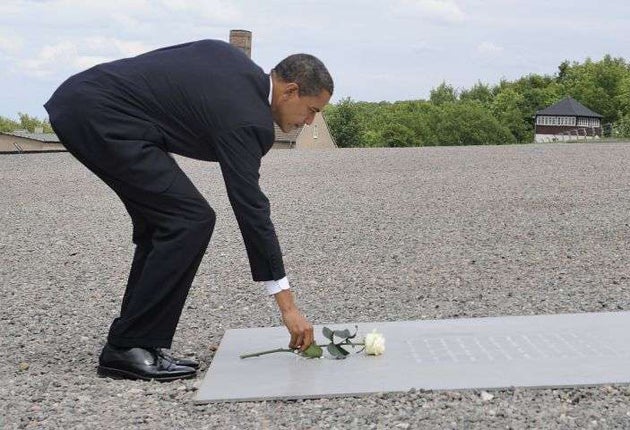A powerful rebuke to Israel's enemies
After his pivotal Middle East speech, Obama pays his respects at the former Buchenwald concentration camp. Tony Paterson reports

Surrounded by the barbed wire of Buchenwald concentration camp, Barack Obama laid a white rose on a memorial to the 56,000 people murdered there by the Nazis yesterday. The US President, on his first ever visit to a concentration camp, and the first by any American President to Buchenwald, described it as the "ultimate rebuke" to Holocaust deniers.
Accompanied by Germany's Chancellor Angela Merkel and the Nobel peace prize-winner and Buchenwald survivor Elie Wiesel, his moving and symbolic visit was made in recognition of Jewish suffering during the Holocaust. It came just a day after his plea in Cairo for compromise in the Middle East.
"To this day there are those who insist that the Holocaust never happened. This place is the ultimate rebuke to such thoughts," Mr Obama said in a remark aimed at Iran, whose President, Mahmoud Ahmedinejad, has caused outrage by questioning whether 6 million Jews died during the Holocaust. "He should make his own visit," Mr Obama said of the Iranian President earlier.
After his tour of the camp crematorium ovens and watch towers, which left him visibly moved, he said that Buchenwald "teaches us that we must be ever vigilant about the spread of evil in our own time, that we must reject the false comfort that others' suffering is not our problem, and commit ourselves to resisting those who would subjugate others to serve their own interests".
The tens of thousands of Buchenwald inmates who perished at the hands of the Nazis from 1937 until 1945 died from starvation, torture, shooting or simply from being worked to death. More than 11,000 of the victims were Jews.
Located on a hill above Goethe's city of Weimar, the camp became infamous because of Ilse Koch, the commandant's wife who was renowned for ordering lampshades to be made out of the skin of murdered inmates. It was also one of the first to be liberated in 1945 by invading American troops.
Mr Obama's great uncle, Charles Payne, was a young soldier in the US Army's 89th Infantry Division which took part in the liberation of a Buchenwald sub-camp outside the town of Ohrdruf, some 25 miles away in April 1945. "In some sheds there were stacks of bodies, stripped... – most of them looked like they had starved to death," Mr Payne recalled in an interview this week. "They had sprinkled lime over them to keep the smell down and stacked them several feet high."
Mr Payne's experiences exerted a powerful influence on Mr Obama who learned of them as a boy. The President said they were one of the chief reasons for his decision to visit the camp. "I have never travelled to concentration camp. This one has a personal connection," he said.
Yesterday Mr Obama was shown where American soldiers found some 900 starving children when they arrived to liberate Buchenwald. Among them was Mr Wiesel, who witnessed his father die on the bunk above him in a vermin-infested camp hut when he was a child. "It was the darkest day of my life," Mr Wiesel recalled yesterday.
The President then went on to visit the American military hospital at Landstuhl in Germany, which has treated hundreds of US troops deployed in Iraq and Afghanistan, before travelling to Normandy for the 65th anniversary of the D-Day landings.
Earlier, Mr Obama and Ms Merkel toured the Church of Our Lady in Dresden, destroyed by bombing during the Second World War. Mr Obama gently reprimanded the German media for playing up a perceived rift with Ms Merkel. "Your characterisation of 'wild speculations' is accurate – they are very wild and based on no facts," he joked, adding that the US-German relationship was "outstanding".
Join our commenting forum
Join thought-provoking conversations, follow other Independent readers and see their replies
Comments
Bookmark popover
Removed from bookmarks